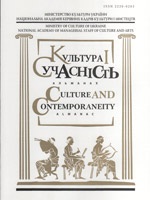ГЛОБАЛІЗАЦІЯ ЯК ФАКТОР ФОРМУВАННЯ СУЧАСНОГО КУЛЬТУРНОГО ПРОСТОРУ В УКРАЇНІ
DOI:
https://doi.org/10.32461/2226-0285.2.2015.146960Ключові слова:
культурний простір, глобалізація, підходи до дослідження культурного просторуАнотація
У статті визначено культурологічний аспект поняття "культурний простір", досліджено основні підходи до його аналізу, виявлений зв’язок між сучасними вимогами до розвитку культури і духовністю в епоху глобалізації. Запропоновано класифікацію підходів до визначення сутності та рис комплексного поняття "культурний простір", а також розкрито зміст цих підходів. У світлі суперечливого характеру наслідків глобалізації розкрито суть і суперечливість її впливу на розвиток культурного простору взагалі і України зокрема.
Посилання
Frey B. Revolution in Economics (Munich dectures in Economics) /B. Frey. Happiness A. – Cambridge: The MIT Press, 2010. – 256 p.
Fukuyama F. Trust: The Social Virtues and The Creation of Prosperyty/ F.Fukuyama . – N. : The Free Press,1995. – 480 p.
Ohmae, Triad Pover. The coming shape of globai Competion. – Free Press, 1985.
Wallersrein I. Klassenanalyse und Weeltsystemanalyse. In: Soziale Unmoglichkeiten- Soziale Welt. Sonderland 2. Gottingen. 1983.
Robertson R. Globalisation /Robertson R. – L., 1992.
Kiely R. Globalisation, post – Fordism and the contemporary context of development// Intern. Soziology . – 1998. – vol. 13,1, 95-115.
Reinicke W. H. Global public Foreign affairs /Reinicke W. H. – 1997. – vol. 76.
Друкер П. Бизнес и инновации. Пер. с англ. М.Д. Вильямс /Друкер П. 2007. – 432 с.
Білорус О. Г. Глобалізація і національна стратегія України / О. Г. Білорус. – Броди: Просвіта; К. : Батьківщина, 2001.
Соколенко С. К. Глобалізація і економіка України. К. КНЕУ, 2009.
Филипенко А. С. Экономическая глобализация: истоки и результат /Филипенко А. С. – М. : Экономика, 2010.
Клочко В. П. Глобалізація: економічні та соціально-культурні аспекти / Клочко В. П. – К., 2005.
Дилигенский Г. Г. Глобализация в человеческом измерении / Дилигенский Г. Г. // Материалы постоянно действующего междисциплинарного клуба ученых // Глобальный мир. – 2002. – Вып. 6 (18).
Frey, B., Happiness, A. (2010). Revolution in Economics (Munich dectures in Economics B. Frey. – Cambridge: The MIT Press [in English].
Fukuyama, F. (1995). Trust: The Social Virtues and The Creation of Prosperity/ F.Fukuyama – N. – 4: The Free Press., [in English].
Ohmae, Triad Pover (1985). The coming shape of global competition.- Free Press. [in English].
Wallersrein, I. (1983). Klassenanalyse und Weeltsystemanalyse. In: Soziale Unmoglichkeiten- Soziale Welt. Sonderland 2. Gottingen. [in German].
Robertson, R. (1992). Globalisation. L. [in English].
Kiely, R. (1998). Globalisation, post – Fordism and the contemporary context of development. Intern. Soziology 13,1, 95-115 [in English].
Reinicke, W. (1997). Global public policy. Foreign affairs. vol. 76 [in English].
Druker, P. (2007). Biasness and innovations. M. Willanz [Trans.] [in Ukrainian].
Bilorus, O. (2001). Globalization and national strategy of Ukraine. O.G. Bilorus. Brody. Prosvita. K. Batkivshina [in Ukrainian].
Sokolenko, S. (2011). Globalization: economy of Ukraine. Kyiv, KNEU [in Ukrainian].
Filipenko, A. (2010). Economic globalization: origins and results. Moscow Economica [in Russian].
Klochko, V. (2005). Globalization of economics and social-cultural aspects. Kyiv [in Ukrainian].
Diligenski, G. (2002). Globalization in human mode. Proceedings of the permanent interdisciplinary club of the scientists. Globalnyi mir, 6 (18) [in Russian].
доктор экономических наук, професор, профессор кафедры арт-
менеджмента и ивент-технологий Национальной академии руководящих кадров культуры и искусств14. Kravchenko, A. (2001). Cultural studies. Moscow [in Russian].
##submission.downloads##
Номер
Розділ
Ліцензія
Авторське право (c) 2018 Альманах "Культура і Сучасність"

Ця робота ліцензується відповідно до Creative Commons Attribution 4.0 International License.
Автори, які публікуються у цьому журналі, погоджуються з наступними умовами:
- Автори залишають за собою право на авторство своєї роботи та передають журналу право першої публікації цієї роботи на умовах ліцензії Creative Commons Attribution License, котра дозволяє іншим особам вільно розповсюджувати опубліковану роботу з обов'язковим посиланням на авторів оригінальної роботи та першу публікацію роботи у цьому журналі.
- Автори мають право укладати самостійні додаткові угоди щодо неексклюзивного розповсюдження роботи у тому вигляді, в якому вона була опублікована цим журналом (наприклад, розміщувати роботу в електронному сховищі установи або публікувати у складі монографії), за умови збереження посилання на першу публікацію роботи у цьому журналі.
- Політика журналу дозволяє і заохочує розміщення авторами в мережі Інтернет (наприклад, у сховищах установ або на особистих веб-сайтах) рукопису роботи, як до подання цього рукопису до редакції, так і під час його редакційного опрацювання, оскільки це сприяє виникненню продуктивної наукової дискусії та позитивно позначається на оперативності та динаміці цитування опублікованої роботи (див. The Effect of Open Access.


